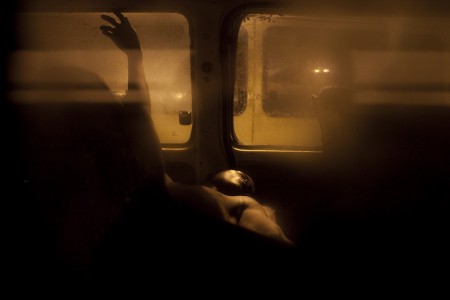Exposure
2010 Recipient: Samuel James

|
|
SAMUEL JAMES
Samuel James (b. 1986) is a photographer and writer from Cincinnati, Ohio. He is the Program Coordinator for the Program for Narrative and Documentary Practice of the Institute for Global Leadership at Tufts University and teaches the course "Introduction to Narrative and Documentary Practice" at Tufts. Since 2007, he has been working on an extensive documentary engagement with Nigeria, Africa’s most populous and largest oil-producing nation. He is the inaugural recipient of the Alexandra Boulat Award for Photojournalism, given collaboratively by VII and the Institute for Global Leadership. The award allowed him to continue exploring the realm of Area Boys in Lagos, Nigeria. Samuel holds a degree in political science from Tufts University and studied photography at the School of the Museum of Fine Arts, Boston. As a student at Tufts, he was selected into the inaugural group of Institute for Global Leadership Synaptic Scholars, was a member of the photojournalism and human rights group Exposure, and worked as a Student Research Fellow of the Social and Economic Rights Action Center (SERAC) in Lagos.
Below is a sample of the work which will be published on the VII web site.
LAGOS, AREA
Nigerians generally don’t believe in chance encounters. Omi ni leyan, as the Yoruba might say, people flow like water. Such is Lagos, with its 20 million converging souls, meeting, parting, flowing into and away from each other and back again. Such are these tales of passage into the Lagos darkwaters—guided by its keepers, the Area Boys.
Born of the waste and animus contradiction of a society resting on a multi-billion dollar oil industry while the mass of its citizens live in extreme poverty, the story of Area Boys is an allegory for survival at the margins of the global economy. As the price of oil fell in the 1980s, inflation, structural adjustment and the mass plunder of public resources by successive military regimes pushed most Nigerians deep into poverty. Millions migrated to Lagos searching for a better future. With its skyrocketing population and eroding infrastructure, a swelling number of youth were effectively forced out of their homes and into the street.
Legendary Nigerian songwriter Fela Kuti described the ensuing chaos this way:
“I sing for one street for Lagos
Dem call am Ojuelegba
I take am compare how Nigeria be
One crossroad for center town
…Motor come from East
Motor come from West
Motor come from North
Motor come from South
…And policemen no dey for center
Na confusion be dat o.”
Released in 1989, ‘C.B.B. (Confusion Break Bone)’ renders the Ojuelegba bus stop—one of the busiest transit points in Lagos—as a metaphor for a nation in distress. Vehicles from all directions coalesce in confusion, with nobody directing traffic. It was in this context that gangs of street youths organized themselves and began their conquest of the Lagos transport economy. Expansive and evolving systems were established, absorbing masses of lost and dispossessed youth—‘born troways’ (throwaways)—who society rejected. The Area Boys, as they are known today, emerged as the shape-shifting masters of the Lagos crossroads.
This is a journey through their realm.
Omi ni leyan.

